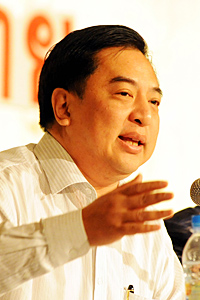
Flooding is not a new phenomenon for Thailand. We are in a tropical region. Our ancestors not only survived, but thrived in this climate. But it is a challenge for our generation to deal with the deluges.
Ayutthaya, our old capital, is situated on high land surrounded by water. Not only was the area fertile for growing rice, but floods were an advantage in terms of security. When our enemies, namely the Burmese, invaded the old capital, if they could not win quickly enough, they were forced to return home when the rainy season arrived.

When King Rama I decided to build the new capital in Bangkok in the 18th century, he had similar considerations in mind. Strategically located on the Chao Phraya River delta bank, water was in abundance. Floods brought nutrients that enriched fertile rice fields and provided natural defences against potential invaders. The open sea of the Gulf of Siam gave traders easy access to the world.
Past kings and their aristocratic technocrats were smart to have devised a system of canals -- or klongs -- to connect to the river, creating transportation and trading routes with boats and floating markets. The klong network also acted as irrigation channels as the city expanded. Bangkok was dubbed the "Venice of the East", embracing all the beauty and romantic connotations of the name coupled with the mystique of Asia.

Suranand Vejjajiva was secretary-general to the prime minister during the Yingluck Shinawatra government and is now a political analyst.
Unfortunately, the modern city builders did not preserve the heritage, nor did they understand nature. The suburbs invaded rice fields and then turned them into new city centres over and over until Bangkok sprawled in all directions. My great grandmother once told me the dirt road ended at Asok and beyond was all rice fields. Now Sukhumvit is paved all the way to Bang Na -- bang means area and na is rice fields -- and beyond.
The small city of a few hundred thousand grew into a metropolis of 12 million. Along the way, a number of roads were built as the culture of travelling in cars took over. Most of the klongs were filled up with smaller underground drainage pipes. Only a few open klongs were left with water gates built in an attempt to control the tide of floods from the river and reverse drainage into the sea.
We thought modern engineering would work, and we could control the environment. We went against nature and now we have been caught at the losing end.
I am not a fan of the blame game of who did (or didn't) do what. And my sympathies go to all the hard-working officials of the Bangkok Metropolitan Administration (BMA), especially those at the lower rungs, who work around the clock draining water after the rain. But the past is a lesson to be learned from, and here is my take:
It is time the city gathers its best architects and engineers to work on a comprehensive metropolis plan, with a multi-dimensional vision of what our city should look like. We have to work together to stop chaos and decay.
The master plan must recognise one fact: all infrastructure is interconnected. The roads, streets, subways and skytrain are modes of transportation, while underneath, there are pipes and gutters that drain the water to the klongs and ultimately, the rivers. Building one structure affects the others. They should be planned together, including electricity, telephone and various other cables on poles or underground.
We may also have to rethink the klongs -- instead of filling them up, maybe we should dig more.
Bangkok is also known to be "sinking" -- a result of massive land subsidence caused by the heavy and illegal use of underground water. The problem worsens amid heavy non-stop rains, coupled with high tide.
The presence of high-rise condominiums in response to the growing demand of urbanites puts pressure on existing infrastructure in every way. It so happens that older and smaller drainage and sewage pipes cannot handle the increased load. Besides, some real estate projects, in order to avoid water trouble, create higher ground by filling the construction sites with soil and concrete which, in effect, turns them into water retainers. The authorities must demand that these project operators invest in support infrastructure to avoid this problem.
City management must be synched. Some problems that we have overlooked like garbage disposal can aggravate flooding, for instance, if tremendous amounts of garbage, from plastic bottles to disposed furniture such as mattresses, clog waterways. We need campaigns to raise awareness and strong law enforcement on this matter.
What is needed is an overhaul in city administration. Under the centralised structure, city officials put much of their efforts into manual day-to-day work, rather than think of strategic policies. Besides, incentives in terms of payment do not exist.
Solving the problem requires political will, necessary for making tough decisions like clearing structures that obstruct water flow.
Strong law enforcement is needed to ensure that housing estates or industrial estates do not intrude into rice fields. There must be provisions to prevent the passing of costs to others, physically or financially. The tax system should be revised so urban dwellers who have the privilege of a flood-free lifestyle pay higher property taxes.
A comprehensive water management plan must become the nation's top priority. The city administration must abandon patch-work management which merely creates more headaches and think of sustainable long-term solutions. We need that now.
